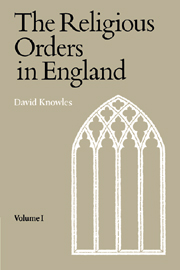Book contents
- Frontmatter
- Contents
- PREFACE
- LIST OF ABBREVIATIONS
- Part One The Old Orders, 1216—1340
- Part Two The Friars, 1216–1340
- Chap. XI The Friars Minor
- Chap. XII The coming of the Minors
- Chap. XIII The order of Preachers
- Chap. XIV The Preachers in England
- Chap. XV The evolution of the Franciscan ideal
- Chap. XVI The apostolic work of the Friars
- Chap. XVII Carmelites, Austin Hermits and lesser orders
- Chap. XVIII The early English Franciscan scholastics
- Chap. XIX Doctrinal and moral controversies: Kilwardby and Pecham
- Chap. XX The Friars from the Council of Lyons to William of Ockham (1272–1340)
- Part Three The Monasteries and their World
- Appendices
- Bibliography
- Index
Chap. XV - The evolution of the Franciscan ideal
Published online by Cambridge University Press: 03 December 2009
- Frontmatter
- Contents
- PREFACE
- LIST OF ABBREVIATIONS
- Part One The Old Orders, 1216—1340
- Part Two The Friars, 1216–1340
- Chap. XI The Friars Minor
- Chap. XII The coming of the Minors
- Chap. XIII The order of Preachers
- Chap. XIV The Preachers in England
- Chap. XV The evolution of the Franciscan ideal
- Chap. XVI The apostolic work of the Friars
- Chap. XVII Carmelites, Austin Hermits and lesser orders
- Chap. XVIII The early English Franciscan scholastics
- Chap. XIX Doctrinal and moral controversies: Kilwardby and Pecham
- Chap. XX The Friars from the Council of Lyons to William of Ockham (1272–1340)
- Part Three The Monasteries and their World
- Appendices
- Bibliography
- Index
Summary
While the Order of Preachers received from its founder an organization complete in every detail and so perfectly devised that it has functioned with little change to the present day, the peculiar genius of St Francis, which was concerned not at all with laws and regulations, left to future generations the task of constitution-building, and in consequence the Friars Minor were slow in evolving a machinery of government, nor did their organization ever equal that of the Preachers in perfect poise, in clarity of outline, and in nice balance of elective and administrative responsibility. Yet here, also, the two first orders of friars interacted upon each other; for while it was without doubt the example of the Franciscans that led the Preachers to become mendicants and allow their early canonical character to fall more and more completely into the background, the Minors still more clearly borrowed from the Dominicans several of the elements of their strong system of government.
The order of St Francis, therefore, took a considerable time in finding that constitutional equilibrium which the Preachers had from their first beginnings, and it was not until the great legislative chapter of Narbonne in 1260, by setting its seal upon the labours of St Bonaventure and his predecessors, had gathered up and codified the experience and decrees of the past, that the Minors had a framework of constitutional law that was fully adequate to their needs, and that guided their destinies throughout the remaining centuries of the medieval period.
- Type
- Chapter
- Information
- Religious Orders Vol 1 , pp. 171 - 179Publisher: Cambridge University PressPrint publication year: 1979



